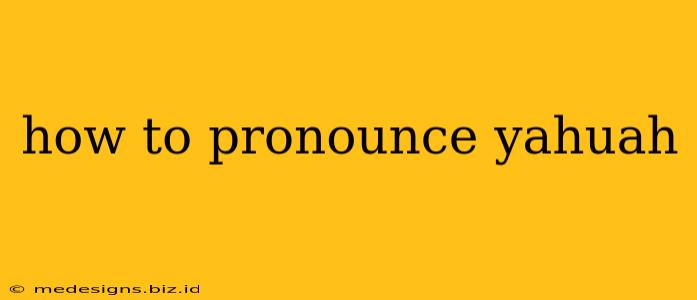The pronunciation of Yahweh, the divine name in the Hebrew Bible, is a subject of ongoing discussion among scholars and religious communities. Unfortunately, there's no single definitive answer, as the precise pronunciation has been lost over millennia. However, understanding the historical context and linguistic considerations allows us to approach a likely approximation.
The Challenges of Pronunciation
The primary challenge lies in the fact that ancient Hebrew didn't have vowels written in its original text. The consonants YHWH (often represented as YHVH) were all that remained. Vowel points were added later by Masoretes, scholars who standardized the Hebrew text, but they used vowel points representing the name Adonai (Lord) as a substitute, indicating a respectful avoidance of pronouncing the sacred name directly.
This substitution meant that the original pronunciation was essentially lost to time. Different scholars and traditions have attempted reconstructions based on related languages and linguistic principles.
Potential Pronunciations and Their Reasoning
Several pronunciations have been proposed, each with its rationale:
Yahweh (Yah-weh):
This is the most commonly accepted pronunciation in English-speaking circles. It's based on comparing the Tetragrammaton (YHWH) to related names and words in other ancient Semitic languages, attempting to reconstruct the likely vowels. This pronunciation emphasizes the likely stress on the first syllable.
Jahweh (Jah-weh):
Some scholars propose this slight variation, focusing on different etymological interpretations and linguistic connections. The difference is subtle, but reflects alternative reconstruction methodologies.
Yahuah (Yah-hoo-ah):
Another proposed pronunciation, this version reflects a slightly different approach to the reconstruction of the vowels. The additional syllable lengthens the pronunciation. This is less commonly used but still represents a valid reconstruction effort.
Why the Uncertainty Matters
The uncertainty surrounding the pronunciation of Yahweh highlights the respectful distance ancient Jews maintained toward the divine name. Avoiding direct pronunciation underscored its holiness and reverence. Even today, this historical context influences how the name is approached and discussed.
How to Approach Pronunciation in Practice
Given the lack of absolute certainty, it's important to be respectful and mindful when discussing the name. Choose a pronunciation based on the scholarly consensus or your specific religious tradition and maintain a sense of reverence in your approach. There's no single “correct” pronunciation. The most important aspect is the intention and the respect given to the name's sacred significance.
Conclusion: Respectful Consideration
Ultimately, pronouncing Yahweh requires balancing scholarly research with a reverential understanding of its historical and religious context. The lack of a definitive answer underlines the holiness and transcendence that the name has held for millennia. Whether you choose Yahweh, Jahweh, or Yahuah, approach it with respect and awareness of its profound significance. Understanding the complexities surrounding its pronunciation helps appreciate the enduring mystery and reverence surrounding this ancient name.
